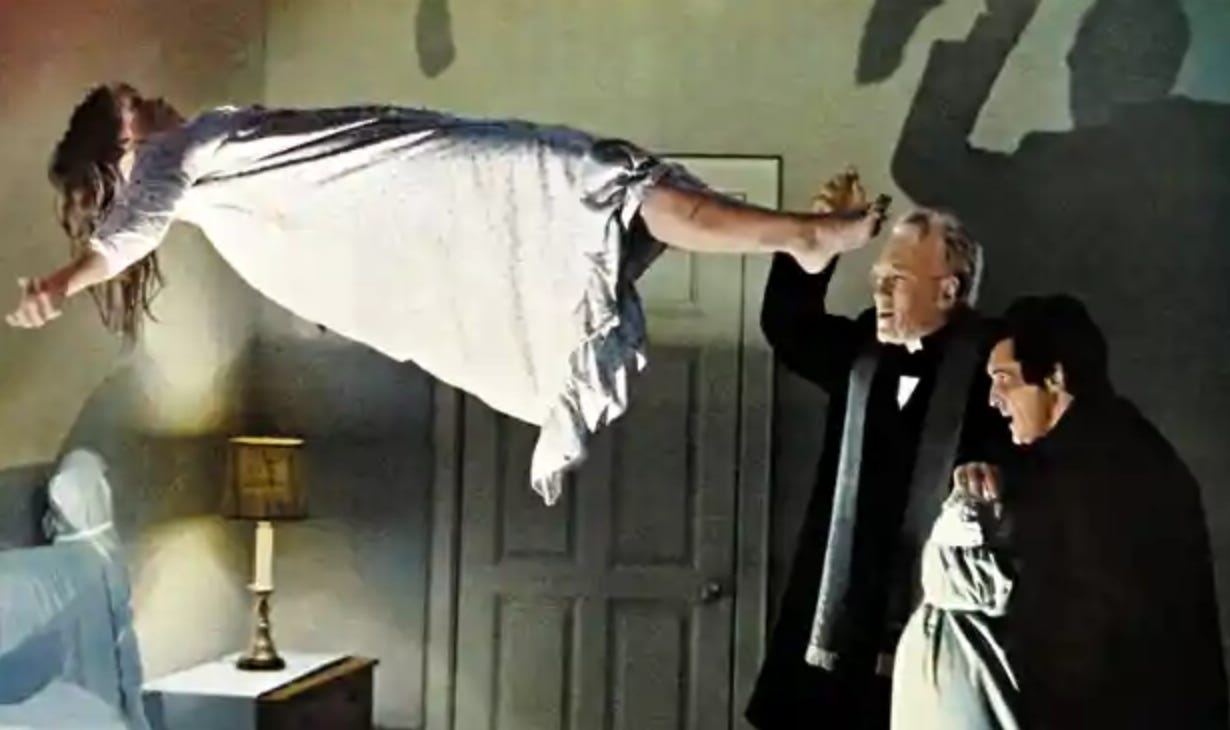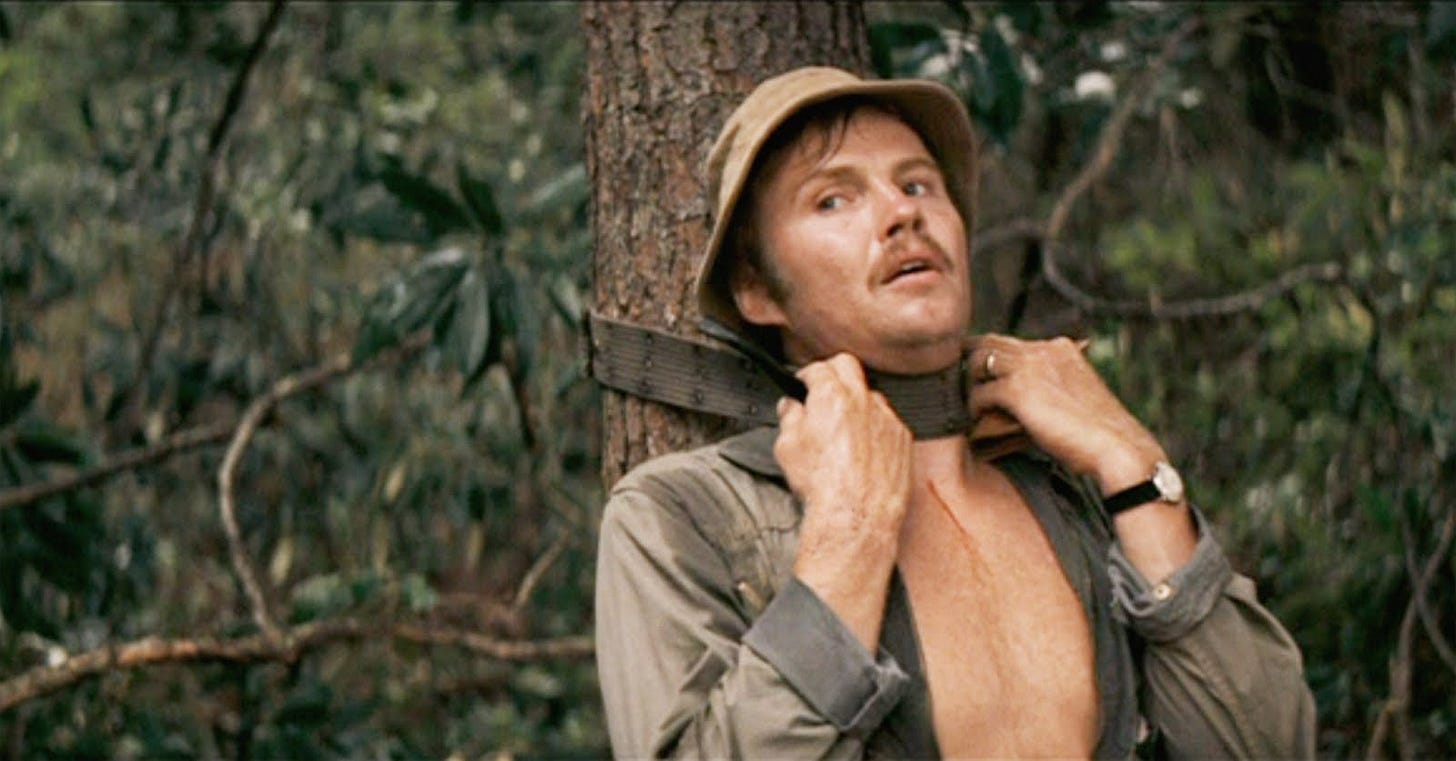The 11 Best Horror Films of the 70s
Sex slugs! Nuns! Banjos!
Index to Best of Horror by Decade.
The Hayes Production Code ended in 1968, and without its warding sigil, all sorts of horror film immorality and grotesqueries were unleashed onto a more or less suspecting populace. The Exorcist topped the box office in 1973; Jaws became the highest grossing movie to that time when it was released in 1975. Major horror directors—David Lynch, David Cronenberg, Wes Craven, John Carpenter—all got their start between 1970 and 1979. Newer subgenres—slashers, rape/revenge, body horror, giallo—joined the old standard monster and vampire pictures. Experimental art films like Ganja and Hess, trashy exploitation like The Toolbox Murders, and prestige vehicles like Deliverance slid around each other in the decade's fertile night soil.
Horror, in short, proliferated like a zombie outbreak in the seventies. As a result, any list of the best films of the decade is going to awaken ancient curses and foul fiends—or, at least, annoy a certain number of fans. As you scroll through, you'll notice that a number of the films and directors I mention in this intro didn't make the (ahem) cut. It's inevitable that some of your favorites (yes, and yours!) have been bloodily excised. What remains, I hope, are a sampling of the very best the decade has to offer, in a range of genres, from a range of directors. Maybe there will even be one or two (unpleasant of course) surprises.
Now get to the list—before it gets to you.
11. Invasion of the Body Snatchers (1978)
The 1956 original, in which alien pods grow exact duplicates of unsuspecting townfolk and replace them with hive mind duplicates, is a paranoid Cold War classic. But somehow this remake by director Philip Kaufman matches it.
Part of the triumph of the later film is the gooier, more viscous special effects; the new pod people, birthed so messily, gain an added frisson of horror. But much of the new energy is down to the performances by Donald Sutherland as health inspector Matthew and Elizabeth Driscoll as Brooke Adams. In the 1950s film, the protagonists were bland and their love affair was largely perfunctory. Sutherland and Adams, though, project funky ease and affectionate heat, and there’s a real sense of loss when these loving, interesting people are replaced by bland, conformist shells. Casting Leonard Nimoy as the emotionless evil pod anti-Spock is one of the 70s great bits of stunt casting.
The movie is even more coy than the original about whether those shells are the outgrowth of creeping Communism or of the censorious American establishment. When Sutherland points and screams in the final image at the non-pods, he may be warning of foreign Soviet invasion. But it feels like he’s embodying an intolerance that is already here.
10. Deliverance (1972)
Deliverance is an iconic film which is nonetheless oddly underrated in the horror canon, perhaps because it was marketed as a suspense thriller. But it's paranoid elaboration of urban/rural tensions is pervasive in the rape/revenge and slasher sub-genres—though few of its successors have matched its lush visuals, or its brutal moral ambiguity. Four Atlanta businessman take a canoeing trip through the Georgia wilderness before a dam floods the area. But they encounter a pair of locals who—in an absolutely unendurable scene—rape Bobby (Ned Beatty) at gunpoint while forcing him to squeal like a pig. The city men kill one of the rapists, but the other escapes, and may or may not track them through the rest of the journey, until the men kill him—or someone else.
Though Deliverance is told from the perspective of the city men, it never lets you get comfortable with them. Action hero Burt Reynolds gets injured and sidelined well before the end, as if casting easy heroism aside. More, the movie compares Bobby's sexual assault to the destruction of the land, and it's never clear who is ultimately exploiting who. The slickers' semi-incompetent woodcraft is contrasted with the stunning banjo-picking by a boy they encounter, and if the city men emerge battered in body and soul, the water drowning everything behind them serves as a kind of absolute revenge, erasing their shame, their deeds, and their complicity. It's an enormously uncomfortable film, both in its ugliness and in its beauty. You can't ask more of the horror genre than that.





